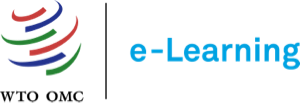What we do
Main content blocks
What we do
WTO e-Learning courses are primarily addressed to trade practitioners. Their focus is on the effective transfer of applied knowledge, skills, and competencies through a diverse toolkit of training products and methodologies. These includes: online learning, blended learning, self-training courses, online webinars, and mobile learning.
Online elearning
Embark on a flexible learning journey with our online courses
The WTO e-Learning programme offers multilingual self-paced elearning courses, accessible free of charge online and in downloadable format. The courses allow you to learn about a trade-related subject based on your individual needs and interests, and the format allows you to study at your own pace, anywhere and at any time. Our design approach is learner-centred, collaborative, multiplatform and multilingual. Each course has a clear purpose and realistic objectives that are measured knowledge checks and a final evaluation.
Government officials who are beneficiaries of WTO training and technical assistance, and who have been formally endorsed by their authorities, are granted unrestricted access to all training materials and activities. They are guided through a structured learning path and receive a WTO certificate upon successful completion of the course—this also serves as proof of having met the required PLS level to access more advanced courses
Self-training
Explore our self-training materials
Access our self-training resources available to individuals who are not beneficiaries of WTO training and technical assistance. Upon registration, these users are automatically granted restricted access, allowing them to enrol independently in most courses on a self-study basis. While they can access the learning content, they are not guided through a structured learning path and do not have access to exams or WTO certificates.
Blended-learning
Mix virtual and face-to-face elements in our blended learning programmes
e-Learning is the entry point to the WTO's Progressive Learning Strategy, which is based on a blended learning approach. Successful completion of basic and intermediate level e-Learning courses is a pre-requisite for participation in advanced level courses, which are held face-to-face or online. Participants in WTO's face-to-face and virtual training courses have access to virtual classrooms set up for this purpose on the e-Learning platform. These virtual classrooms support participants in their learning journey and provide access to all course materials and tests 24/7, on any device.
Live sessions
Bring your study to life by attending webinars
Registered participants can attend fortnightly webinars on topical e-Learning and WTO issues. These seminars provide an opportunity to complement self-study with live discussions with peers and other WTO/trade experts, and to apply the acquired knowledge in a practical learning environment.
Mobile learning
Learn whenever and wherever with our new mobile application
You can now download the WTO e-Learning application here, and all courses are fully compatible with smartphones and tablets. The application allows you to download all courses, to read the training material offline. This brings more flexibility to your learning journey and enables learning on the go.
Featured Courses
Development Assistance Aspects of Cotton & Introduction to World Cotton Day
This third course of the Cotton course series sheds light on how the WTO tracks cotton development assistance and connects donors with beneficiaries. You will discover tools to access key information and dive into the story behind World Cotton Day—why it is celebrated, where it is marked, and how you can take part in honoring cotton’s global significance.
Course Trailer:
Course Structure:
- The WTO’s work on the development assistance aspects of cotton
- Monitoring Development Assistance: Monitoring tools
- Monitoring Domestic Sector Reforms
- Director-General’s Periodic Reports
- Other tools
- World Cotton Day
Why Trade in the Digital Era Matters
The digital revolution is reshaping trade as we know it. This first course of the Trade in the Digital Era course series takes you inside the rise of the digital economy to explore how technology is transforming what we trade and how we trade it. Discover the exciting benefits of digital trade—alongside the challenges it brings—and gain a clearer understanding of its growing role in today’s connected world.
Course Structure:
- Introduction
- The rise of the digital economy
- The benefits of digital trade
- The challenges of digital trade
Administration and enforcement of the GPA 2012
This second course of the GPA 2012 course series provides a deeper look into how the WTO’s GPA 2012 is implemented and enforced. You will explore the role and responsibilities of the Committee on Government Procurement (CGP), learn how the Agreement is enforced at the national level through domestic review procedures, and understand how disagreements are addressed through the WTO’s dispute settlement system.
Course Structure:
- Module 1 - The Committee on Government Procurement (CGP), and Mandated CGP Work (except accessions)
- Module 2 - Domestic enforcement: Domestic review procedures
- Module 3 - International enforcement: WTO dispute settlement procedures
Restrictions quantitatives - Prohibitions et autres restrictions au titre de l'article XI du GATT
Ce cours offre une introduction complète aux restrictions quantitatives dans le commerce international. Découvrez leur portée, leurs effets sur les échanges et les exceptions autorisées. Comprenez les exigences de notification de la Décision sur les restrictions quantitatives et les implications plus larges de ces mesures sur les flux commerciaux et l’accès aux marchés.
Structure du cours:
- Module 1 - Renseignements d’ordre général concernant les restrictions quantitatives
- Module 2 - Notification des restrictions quantitatives
